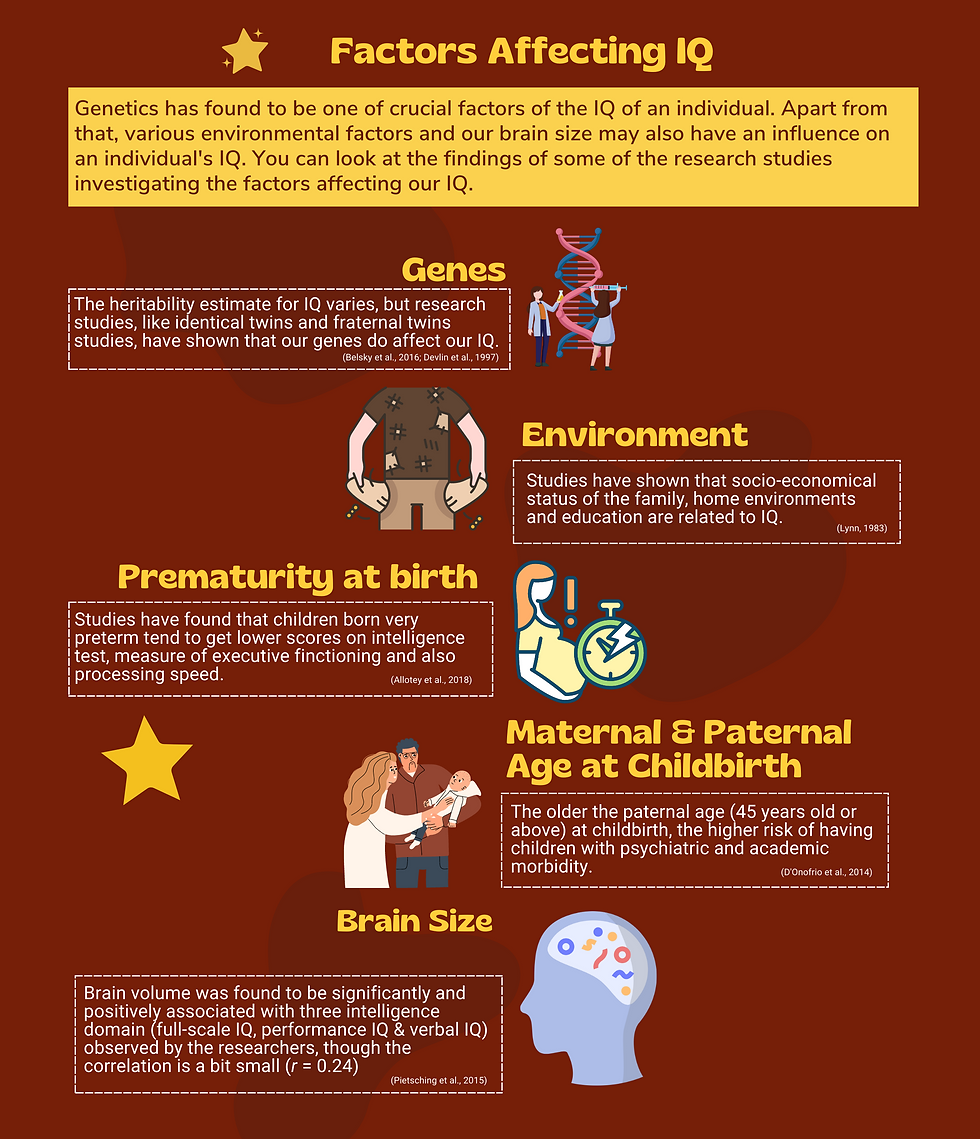ASSESSMENT WISE
Cognitive Assessments
Cognitive assessments (or intelligence testing) are used to determine an individual’s general thinking and reasoning abilities, also known as intellectual functioning or IQ. IQ tests are a norm-referenced measurement, meaning an individual's performance is compared with the performance of a representative group (norm).
Not only can we know about a general IQ of an individual, but also learn about his/her strengths and weaknesses through a cognitive assessment.


What do cognitive assessments measure?
Cognitive assessments are designed to measure different abilities such as reasoning, perception, memory, verbal ability, mathematical ability, and problem solving involved in thinking. IQ test results fall along the normal (bell-shaped) curve, with an average IQ of 100, and individuals who are intellectually disabled are usually two standard deviations below the average (IQ below 70). Individuals who are gifted are usually two standard deviations above the average (IQ above 130).

2SD below mean (70)
Average (100)
2SD above mean (130)
Diagnostic Criteria (DSM-5)
Intellectual disability involves impairments of general mental abilities that impact adaptive functioning in three domains, or areas. These domains determine how well an individual copes with everyday tasks:
-
The conceptual domain includes skills in language, reading, writing, math, reasoning, knowledge, and memory.
-
The social domain refers to empathy, social judgment, interpersonal communication skills, the ability to make and retain friendships, and similar capacities.
-
The practical domain centers on self-management in areas such as personal care, job responsibilities, money management, recreation, and organizing school and work tasks.
To be diagnosed with intellectual disability, an individual’s symptoms must begin during the developmental period and are diagnosed based on the severity of deficits in adaptive functioning.
Screening and Assessment in Hong Kong
Diagnostic Test
-
Wechsler Preschool and Primary Scale of Intelligence – 4th (Hong Kong) [WPPSI-IV (HK)]
-
Wechsler Adult Intelligence Scale 4th Edition (Hong Kong) [WAIS-IV (HK)]
-
Wechsler Intelligence Scale for Children – 5th Edition (United States) [WISC-V (US)]
-
Woodcock Johnson IV - Test of Cognitive Abilities (WJ-IV-COG)
Screening Test
-
Raven's Progressive Matrices (Standard Progressive Matrices)
-
Test of Nonverbal Intelligence - 4th Edition (TONI-4)
-
Leiter International Performance Scale - Third Edition (Leiter-3)
References
-
Devlin, B., Daniels, M., & Roeder, K. (1997). The heritability of IQ. Nature, 388(6641), 468-471.
-
Belsky, D. W., Moffitt, T. E., Corcoran, D. L., Domingue, B., Harrington, H., Hogan, S., ... & Caspi, A. (2016). The genetics of success: How single-nucleotide polymorphisms associated with educational attainment relate to life-course development. Psychological science, 27(7), 957-972.
-
Lynn, R., Hampson, S. L., & Magee, M. (1983). Determinants of educational achievement at 16+: Intelligence, personality, home background and school. Personality and Individual Differences, 4(5), 473-481.
-
Allotey, J., Zamora, J., Cheong‐See, F., Kalidindi, M., Arroyo‐Manzano, D., Asztalos, E., ... & Thangaratinam, S. (2018). Cognitive, motor, behavioural and academic performances of children born preterm: a meta‐analysis and systematic review involving 64 061 children. BJOG: An International Journal of Obstetrics & Gynaecology, 125(1), 16-25.
-
D’Onofrio, B. M., Rickert, M. E., Frans, E., Kuja-Halkola, R., Almqvist, C., Sjölander, A., ... & Lichtenstein, P. (2014). Paternal age at childbearing and offspring psychiatric and academic morbidity. JAMA psychiatry, 71(4), 432-438.
-
Pietschnig, J., Penke, L., Wicherts, J. M., Zeiler, M., & Voracek, M. (2015). Meta-analysis of associations between human brain volume and intelligence differences: How strong are they and what do they mean?. Neuroscience & Biobehavioral Reviews, 57, 411-432.